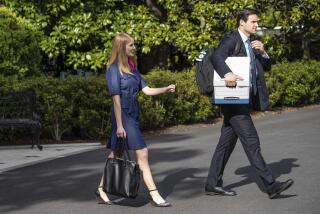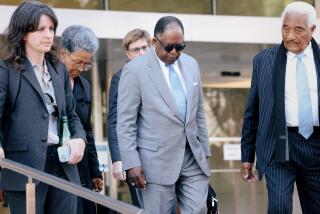Legal observers puzzled by an implausible tale
- Share via
WASHINGTON — Most legal experts were not surprised Tuesday when jurors convicted I. Lewis “Scooter” Libby on four of five counts of lying to federal investigators.
What puzzled some of the experts were the statements Libby made to investigators about when and how he learned that Valerie Plame was a CIA agent. Libby said NBC reporter Tim Russert told him during a July 2003 phone conversation. At trial, Libby’s claim was contradicted by nine witnesses, including government officials, who said he had talked to them about Plame weeks earlier.
“I do not understand why he did that, or what advice of counsel he had. It is a real question in this case. And it defies explanation,” said Washington attorney Robert S. Bennett.
From the outset, as legal experts saw it, the case against Libby was simple and straightforward -- and hard to defend against.
The problem with Libby’s statements to investigators was that he had held meetings and telephone conversations with other reporters, as well as with various government officials, to talk about Plame and her husband, former envoy and Iraq war critic Joseph C. Wilson IV, during the previous month. Two CIA officials, a former State Department official, two former White House spokespersons and several journalists who testified reluctantly about their confidential conversations with Libby told the jury they heard Libby talking about Plame well before he spoke to Russert.
Libby’s defense argued that he had simply forgotten about those earlier conversations and had not meant to lie to the FBI.
But Wilson and Plame were not minor figures to White House insiders, nor were they easy to forget. Vice President Dick Cheney and others were furious at Wilson for saying President Bush had falsely claimed in his State of the Union message that Iraqi leader Saddam Hussein had tried to buy uranium in Niger. Wilson based his accusation -- which undercut Bush’s claim that Iraq was seeking nuclear weapons -- on a fact-finding trip he had made to Africa, a trip sponsored by the CIA and arranged in part by his wife.
Moreover, with their client facing charges of deliberately lying to investigators who were probing the leaking of Plame’s identity, Libby’s lawyers claimed that Cheney’s former chief of staff had a faulty memory. At the same time, they said he remembered well that it was Russert who first told him that Wilson’s wife worked for the CIA.
Jurors were not persuaded.
“If someone knowingly tells a lie under oath, it is every prosecutor’s duty to bring charges,” Special Prosecutor Patrick J. Fitzgerald said after the verdict. “We knew Mr. Libby had told a story, and we could not walk away from that.”
Why did Libby tell an implausible story to FBI agents and later to the grand jury? veteran defense lawyers wondered Tuesday.
He may have felt trapped. In July 2003, when the issue of the Plame leak boiled up, Bush said firmly that he wanted to know whether anyone in the White House had leaked classified information. Plame’s identity as an undercover agent was classified and secret, Fitzgerald said again Tuesday.
That October, an FBI agent interviewed Libby. At that time, the investigation was an internal matter within the Bush administration. But under pressure from Congress, Atty. Gen. John Ashcroft stepped aside and had his deputy appoint a special prosecutor. He chose Fitzgerald, a U.S. attorney from Chicago with a reputation for doggedness.
By March 2004, when Libby was called before the grand jury, Fitzgerald had witnesses within the White House who could contradict the chief of staff’s account.
Since the Watergate scandal of the 1970s, one of Washington’s favored cliches has been that it’s not the crime but the cover-up that gets officials into trouble.
“This is emblematic of these cases,” said Stanley Brand, a longtime defense lawyer. “Smart people go before an investigator and they don’t have their facts straight. Maybe he [Libby] believed he could get away with it because the reporters would not talk.”
Prosecutor Fitzgerald surprised some in Washington by insisting that journalists who had spoken to Libby would have to talk to him and the grand jury.
Then-New York Times reporter Judith Miller went to jail to protect the confidentiality of her conversations with Libby, and she eventually relented and testified against him.
George Washington University law professor Stephen Saltzburg wondered whether the culture of Washington and the Bush White House might have led to Libby’s downfall.
“This administration seems to have had a very difficult time being candid with the American people. Maybe if you get into the habit of saying what you wish things to be -- like Iraq’s weapons of mass destruction are a ‘slam dunk,’ or ‘We’re making good progress in Iraq’ -- you have a hard time speaking candidly. They may spin the press and the public. Maybe he tried to spin the FBI too,” said Saltzburg, a prosecutor during the Iran-Contra probe of the 1980s.
Libby was himself a prominent lawyer, a graduate of Yale University and Columbia Law School. In the 1990s, he represented fugitive financier Marc Rich and helped win for him a pardon from President Clinton.
Now his hopes rest with a successful appeal in the federal courts in Washington or with a pardon from President Bush. There, he has some precedents on his side.
After the Iran-Contra scandal in the Reagan administration, two White House officials -- National Security Advisor John Poindexter and his aide Oliver North -- were found guilty on several criminal charges. But the U.S. appeals court here overturned their convictions.
And just before leaving office, President George H.W. Bush handed down pardons for several others, including President Reagan’s Defense Secretary Caspar Weinberger.
More to Read
Sign up for Essential California
The most important California stories and recommendations in your inbox every morning.
You may occasionally receive promotional content from the Los Angeles Times.














